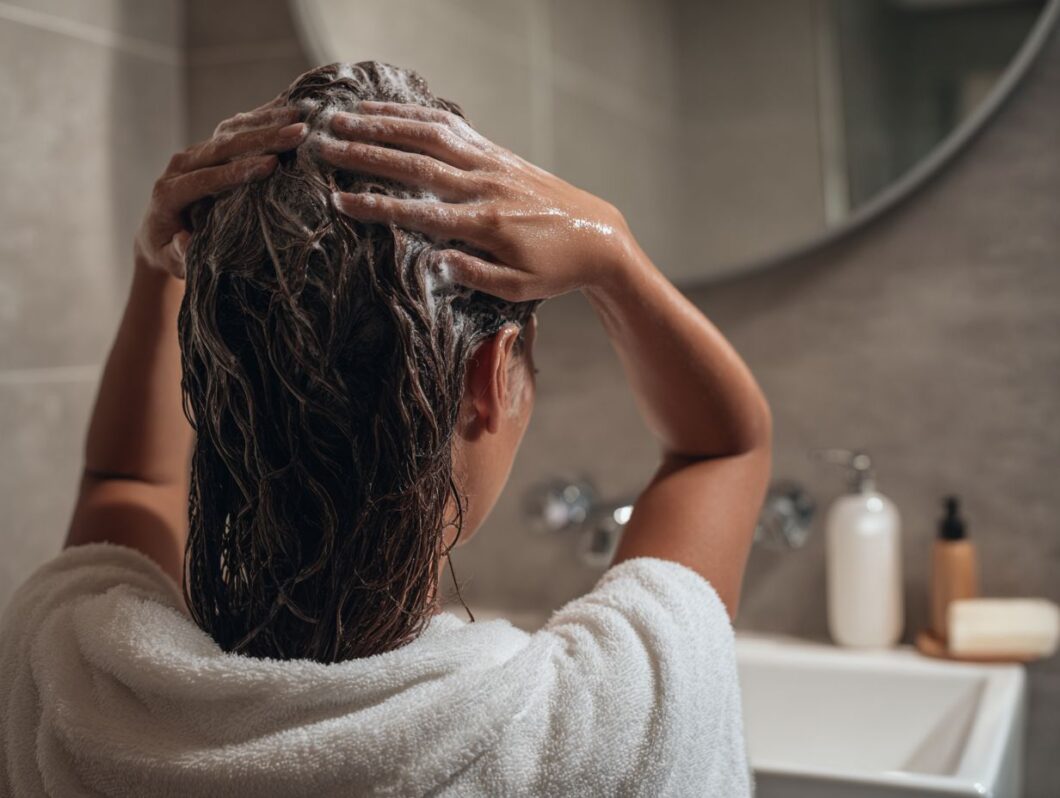How often should I wash my hair? This question lingers for many of us, from those with luscious locks to those struggling with oily roots. Finding the right frequency isn’t just a matter of preference-it impacts scalp health, hair texture, and overall appearance. In this exploration, I’ll delve into hair types, lifestyle factors, and debunk common myths, offering you tailored insights that could transform your hair care routine. Let’s unlock the secrets to healthier hair together.
Understanding Hair Types and Hair Hygiene
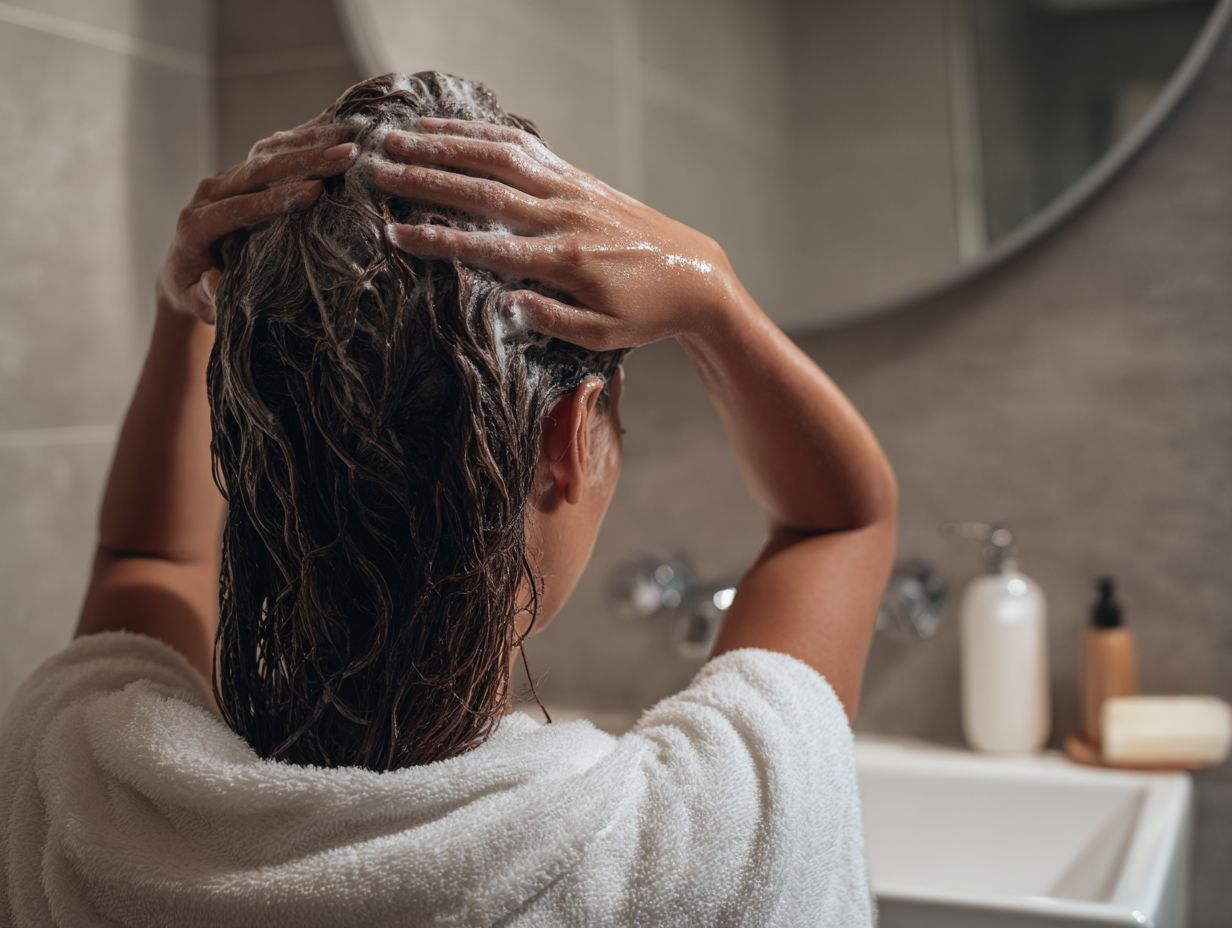
I understand that each hair type-whether oily, dry, or normal-has its own unique characteristics that determine how often it should be washed, considering the frequency of washing hair.
Oily Hair
Oily hair is a result of excess sebum production, which often necessitates more frequent washing to maintain scalp health and prevent greasy hair.
For optimal results, I find that washing my hair daily or every other day effectively manages oil levels. I prefer using a sulfate-free shampoo, such as Ouai Fine Shampoo or L’Oral Paris EverPure Sulfate Free Shampoo, as these options cleanse without stripping the natural moisture from my hair.
Incorporating dry shampoo between washes proves beneficial for absorbing excess oil and refreshing my hair. I also apply a lightweight conditioner only to the ends to avoid adding unnecessary greasiness.
By establishing this routine, I can achieve healthier, more balanced hair over time.
Dry Hair
I have observed that dry hair often lacks essential moisture, which makes it necessary to wash it less frequently in order to retain its natural oils.
To keep my dry hair properly hydrated, I aim to wash it just once every 3 to 7 days. During each wash, I prefer to use sulfate-free shampoos formulated for moisture, such as SheaMoisture Raw Shea Butter Moisture Restorative Shampoo.
After washing, I incorporate deep conditioners once a week, like Olaplex No. 5 Bond Maintenance Conditioner, to replenish lost moisture. Additionally, I consider using lightweight oils, such as argan or jojoba oil, after styling to lock in hydration.
This regimen not only promotes healthier hair but also helps maintain vital oils and prevents further dryness.
Normal Hair
Normal hair maintains a balance between oily and dry, allowing for a flexible washing schedule that can range from daily to weekly. For optimal care, I recommend washing my hair 2-3 times a week.
Using a sulfate-free shampoo, such as Aveeno Pure Renewal, effectively cleanses without stripping away natural oils.
After shampooing, I follow up with a lightweight conditioner, like Herbal Essences bio:renew, to ensure proper hydration. To enhance flexibility and manageability, I incorporate a dry shampoo, such as Batiste, between washes to absorb excess oil and refresh volume.
This combination helps me keep my hair healthy and manageable, perfectly catering to its naturally balanced state.
Factors Influencing Hair Washing Frequency and Hair Growth
I recognize that several key factors-such as scalp health, hair texture, and lifestyle choices-play a crucial role in determining the optimal frequency for washing hair, including lifestyle habits and environmental factors.
Scalp Health
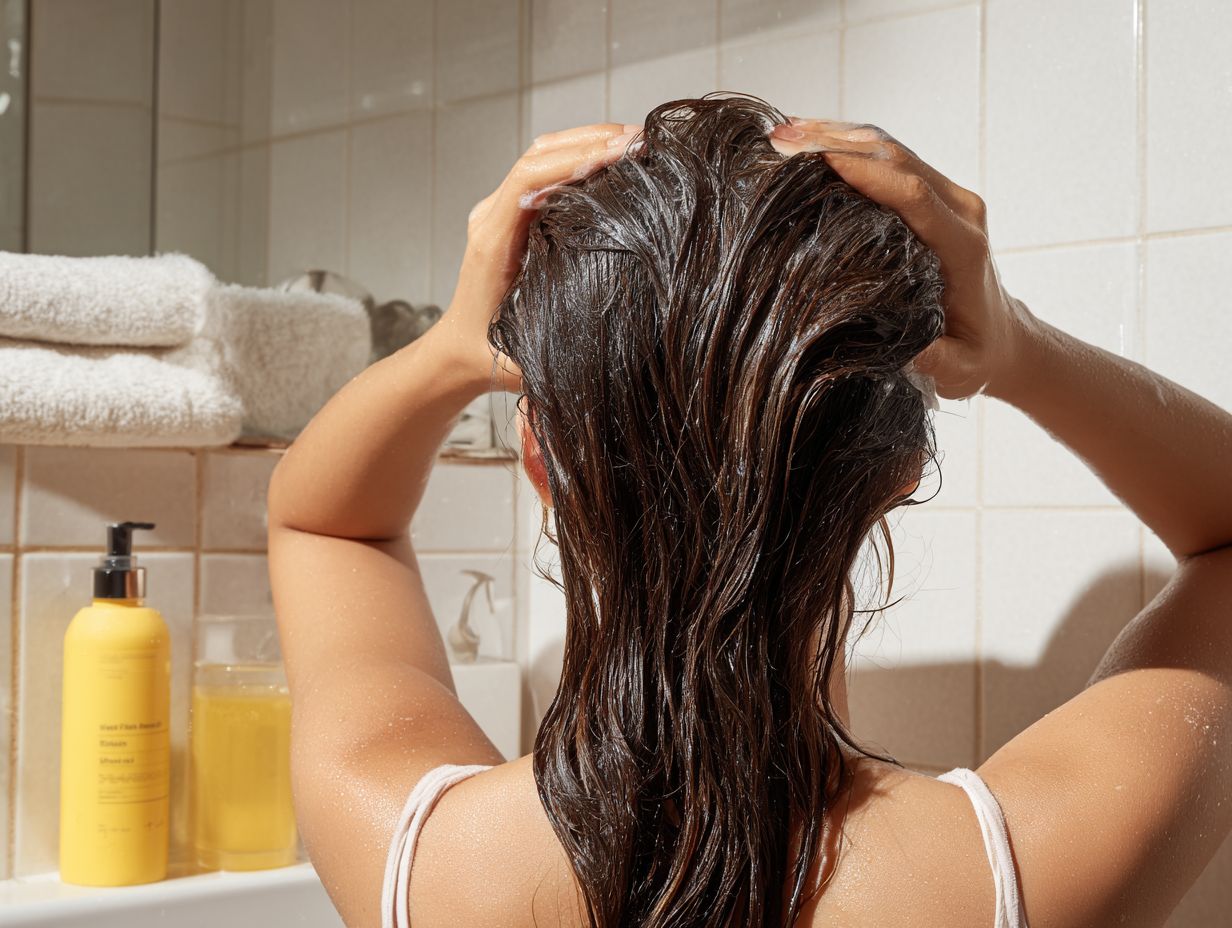
Maintaining a healthy scalp is crucial for hair vitality, and it significantly influences how often I should wash my hair, particularly in relation to specific conditions such as dandruff or irritation.
For individuals coping with dandruff, I find that more frequent washing-ideally every other day-can effectively remove flakes and excess oil. I recommend utilizing medicated shampoos that contain ingredients like ketoconazole or zinc pyrithione, as these specifically target fungal growth.
Conversely, if my scalp is excessively dry or irritated, I adjust my washing routine to once or twice a week, opting for gentle, moisturizing shampoos. Additionally, incorporating scalp treatments such as tea tree oil or apple cider vinegar rinses can promote scalp health without the necessity of daily washing, providing a balanced and effective approach for various scalp conditions.
Hair Texture and Hair Damage Prevention
Different hair textures, ranging from fine to coarse, significantly influence the retention of natural oils, which in turn guides my washing frequency. Fine hair tends to become greasy more quickly, often necessitating washing every 1-2 days. In contrast, coarse hair retains oils better and may require washing only once a week.
To determine my hair texture, I can perform a simple strand test: by taking a single hair and assessing its feel-if it appears thin and fragile, I likely have fine hair. Conversely, if the strands feel thick and robust, it indicates coarse hair.
Understanding my hair type allows me to tailor my hair care routine effectively, enabling me to select the most suitable products, such as sulfate-free shampoos, for gentler cleansing.
Lifestyle and Activity Level
My lifestyle and activity levels-like how often I exercise and my environmental exposures-play a significant role in shaping my hair washing routine. When I work out frequently, I find it beneficial to wash my hair every 2-3 days rather than sticking to a weekly schedule.
After a good sweat session, I prioritize using a clarifying shampoo, such as Neutrogena Anti-Residue (approximately $10), to effectively remove sweat and any product buildup. I always follow that with a nourishing conditioner, like Aveda Damage Remedy, to ensure my hair stays hydrated.
Additionally, dry shampoo has become a valuable alternative for those in-between wash days, as it effectively absorbs excess oil. For my color-treated hair, I specifically choose sulfate-free options to maintain vibrancy while still addressing my post-exercise hair care needs.
Recommended Washing Frequencies
I understand that establishing specific washing frequencies can optimize hair health and hygiene, tailored to each individual’s hair type and lifestyle.
Daily Washing
I often recommend daily washing for individuals with oily hair or scalp conditions that require regular cleansing. However, it’s important to manage frequent washing carefully, as it can lead to scalp irritation if not done properly.
Selecting the right shampoo is essential in this process.
I advise looking for sulfate-free formulas, as they tend to be gentler on the scalp. For instance, Aveda’s Botanical Shampoo and Paul Mitchell’s Tea Tree Special Shampoo are excellent options that effectively cleanse the hair without stripping it of its natural oils.
Additionally, I suggest incorporating a clarifying shampoo into your routine on a weekly basis to remove buildup without the need for daily use. To maintain balance, it’s also beneficial to include moisturizing conditioners that restore hydration, ensuring a healthy scalp environment and helping to prevent irritation.
Every Other Day
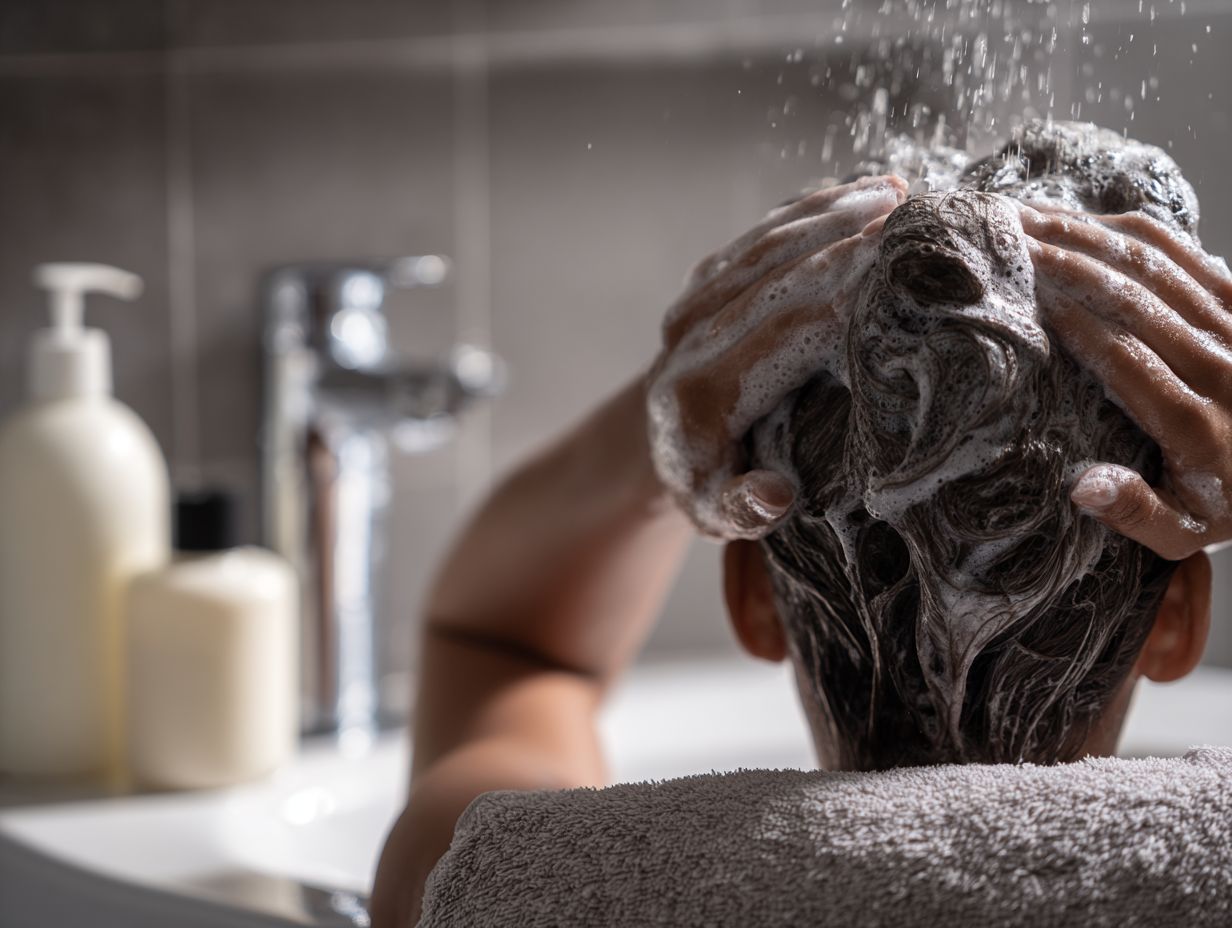
Washing my hair every other day strikes a balance for maintaining normal hair, keeping it clean without stripping away essential oils. To preserve my hair’s health between washes, I incorporate a few effective methods.
For quick oil absorption, I find that dry shampoo works wonders; I apply it directly to the roots and massage it in to blend away any grease. Scalp sprays are another excellent option, providing a refreshing lift and alleviating oiliness while invigorating my scalp.
Additionally, using a silk scarf or scrunchie helps reduce friction and breakage throughout the day, allowing my hair to maintain its style and health.
By implementing these small steps, I can significantly extend the life of my hairstyle.
Weekly Washing
I find that individuals with dry hair may benefit from washing their hair once a week, as this allows the natural oils to nourish the strands effectively.
To enhance the cleansing process during these weekly washes, I recommend using a clarifying shampoo every few weeks to eliminate any product buildup. Following this, it’s beneficial to apply a deep conditioning treatment, such as a hydrating mask, to restore moisture.
When selecting masks, I look for those containing ingredients like argan oil or shea butter, as they provide added hydration. Additionally, I consider incorporating a gentle scalp exfoliant on a monthly basis to promote better circulation and remove dead skin cells.
By alternating these methods, I can achieve cleaner, healthier hair without stripping away its natural oils.
Common Myths About Hair Washing and Personal Hygiene
Debunking common hair washing myths is essential for clarifying misconceptions about the appropriate frequency and techniques, including hair washing myths related to hair damage.
One prevalent myth is that washing hair every day is necessary for maintaining cleanliness. In reality, over-washing can strip the hair of its natural oils, leading to dryness.
For individuals with oily hair, a more effective strategy might involve washing every other day with a sulfate-free shampoo, which cleanses without damaging the scalp. Another misconception is that all hair types require the same washing routine. For instance, curly hair often benefits from less frequent washing and increased moisture, while straight hair may perform better with a more regular washing schedule.
Consulting with a stylist can provide personalized advice tailored to individual hair needs.
Tips for Healthy Hair Washing and Hair Nourishment
Implementing effective hair washing techniques has the potential to significantly improve hair health and enhance the overall washing experience.
Choosing the Right Shampoo and Conditioner
Choosing the right shampoo tailored to my hair type has dramatically improved both my wash results and overall hair health. For instance, when I need hydration and curl definition for my dry or curly hair, I reach for a moisturizing shampoo like SheaMoisture Coconut & Hibiscus Curl & Shine Shampoo.
When my hair feels weighed down by product buildup and dirt, I turn to a clarifying shampoo such as Neutrogena Anti-Residue Shampoo, which effectively removes grime without stripping away my hair’s natural oils. For my color-treated and bleached hair, I opt for sulfate-free options like L’Oral EverPure Moisture Shampoo to help maintain its vibrancy and hair moisture balance.
By selecting shampoos and hydrating products that directly address my hair’s specific needs, I enhance both its appearance and overall health, taking into consideration hair washing tips and personal preference.
Proper Washing Techniques
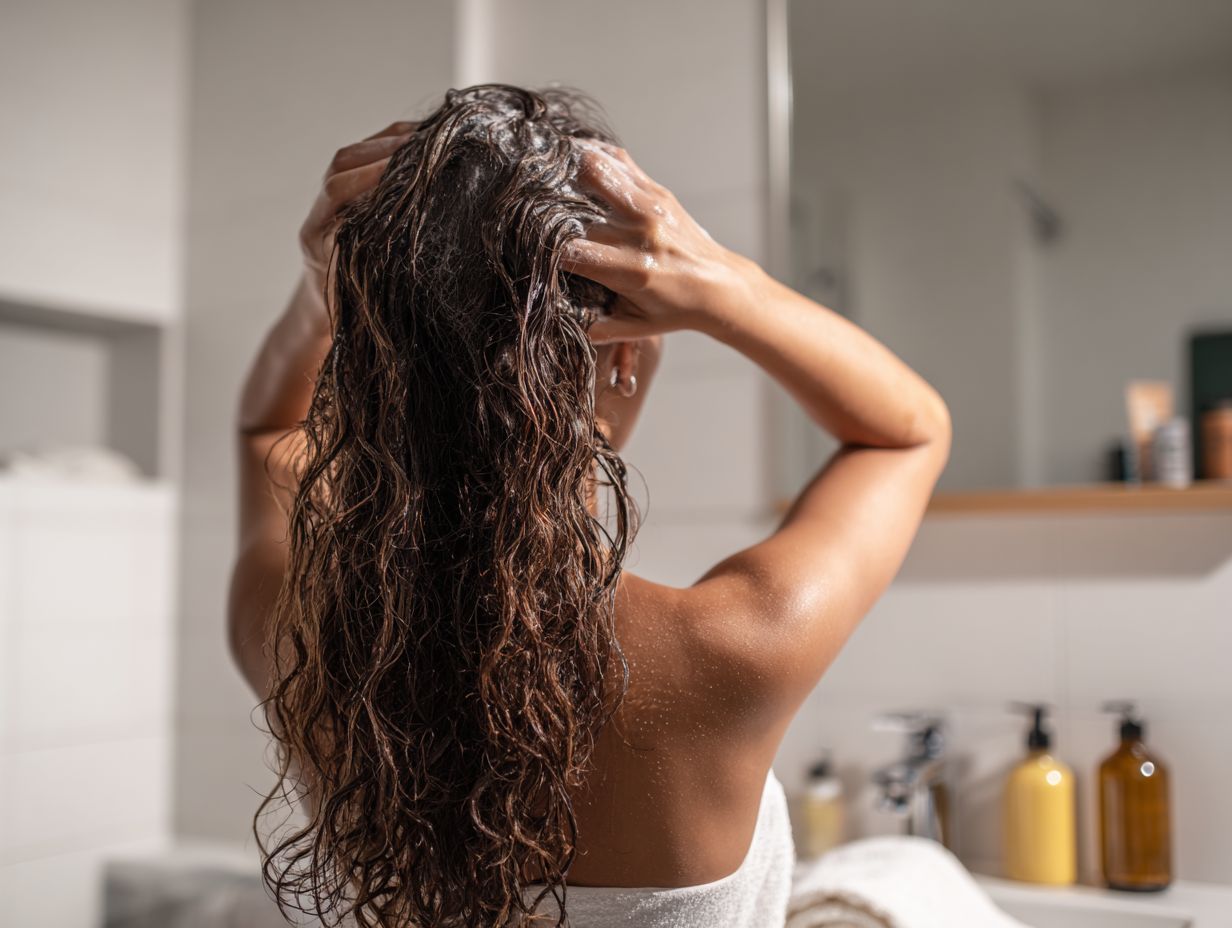
Employing proper washing techniques is essential for maximizing the benefits of my shampoo and conditioner, ultimately promoting a healthier scalp. I begin by gently massaging my scalp with my fingertips instead of my nails to avoid any irritation. I always opt for lukewarm water, as hot water effects on hair can strip away natural oils and contribute to dryness, affecting hair moisture retention.
Regarding applying shampoo, I typically use a quarter-sized amount for medium-length hair, focusing on the roots and scalp. After rinsing thoroughly, I apply the conditioner to the mid-lengths and ends.
I make it a point to leave the conditioner in for 3-5 minutes to ensure optimal absorption and then rinse with cool water to seal the cuticles and enhance shine.
Frequently Asked Questions
How Often Should You Really Be Washing Your Hair and Consider the Hair Cleansing Frequency?
The frequency of washing your hair depends on your hair type and lifestyle, including seasonal changes, workout effects, and water quality. Typically, the recommendation is to wash your hair 2-3 times a week as part of a regular hair wash routine.
What happens if you wash your hair too often?
Washing your hair too frequently can strip it of its natural oils and cause dryness, affecting hair health and moisture. This can lead to an itchy and irritated scalp and damage to your hair, impacting hair follicles.
Can I wash my hair every day?
If you have oily hair or an oily scalp, it may be necessary to wash it every day. However, for most hair types, this can cause more harm than good to hair maintenance and hair cleansing. Try to limit washing to every other day or every few days.
How can I keep my hair clean between washes?
Dry shampoo is a great option for keeping your hair clean between washes, especially in your hair care rituals. It absorbs excess oil and gives your hair a refreshed look, aiding in nighttime hair care.
What if I exercise regularly, should I wash my hair more often?
If you exercise regularly and sweat a lot, you may need to wash your hair more often due to workout effects. However, you can also try rinsing your hair with water and using dry shampoo to freshen it up without stripping it of its natural oils, supporting hair washing benefits.
Is it bad to wash my hair every day if I have dandruff?
Washing your hair every day if you have dandruff may actually make the problem worse for dandruff control. Instead, use a medicated shampoo specifically designed for dandruff and wash your hair every other day or every few days, as advised by dermatologist advice.


